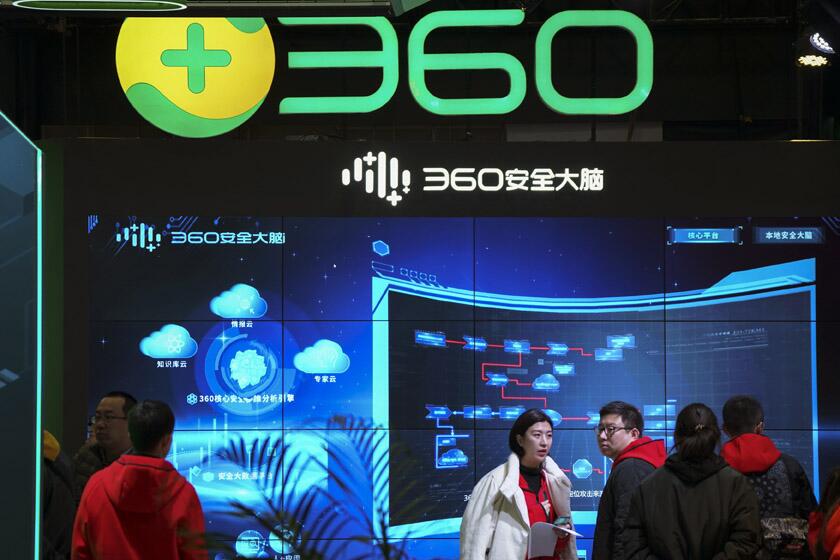Op-Ed: How the West could win a technological ‘shadow war’ with China
A new shadow war is underway within the International Telecommunication Union, one of the obscure organizations that sets global technical standards.
International standard-setting is a morass of positive intentions and poor execution. When the process works well, it selects the best technologies based on merit and, for example, allows people to use their personal cellphone numbers anywhere on Earth. When the system fails, we end up with different electrical outlets in each country and scramble for adapters.
Beijing sees standard-setting as an opportunity to promote Chinese technologies and make them the global standard. It is focusing particular attention on the ITU, which is working to set global fifth-generation, or 5G, mobile telecom specifications.
The U.S. takes a hands-off approach, depending on leading American corporations to put forward great technical contributions and assuming the ITU will judge them based on their merits. Beijing, in contrast, intervenes to boost China’s national champions, particularly Huawei. The result: China is grabbing a growing share of critical patents in the emerging global 5G standard.
To solve this problem, Western governments must take action, but they don’t need a heavy hand — small fixes can ensure the standards-setting system remains fair and transparent.
One of China’s biggest tech companies criticizes the Trump administration for ‘politicizing business’ after it slapped export sanctions on 33 more entities.
With the world distracted by COVID-19, Beijing is pushing forward. In March, China published a 2020 work plan that, among other things, detailed its intentions to promote Chinese global rules for emerging technologies, the result of two years of work and study.
The Chinese campaign normally occurs behind closed doors, but a 2018 dustup over Lenovo’s voting record at the ITU provided a glimpse into how Beijing promotes China’s national champions, particularly Huawei. In one round of voting, representatives of Lenovo — the Chinese computer company that acquired IBM’s personal computer business in 2005 — voted for the American-proposed standard developed by U.S. company Qualcomm over the standard put forward by Huawei. When Chinese web users found out, they whipped up a firestorm of nationalist sentiment.
To defend the company’s reputation as a good Chinese citizen, Lenovo’s founder and CEO issued an extraordinary public statement to explain that Lenovo had voted for Qualcomm in one round because its approach best aligned with Lenovo’s own “early-stage technology and patent reserves,” but that it voted for Huawei in a separate round because “Chinese companies should unite.” Although Lenovo is publicly traded, when it comes to 5G standards, the company is more accountable to Huawei, Beijing’s national champion in the 5G standard realm, and to Chinese nationalist sentiment than to its own shareholders.
These technical efforts may fly under the radar of U.S. senior officials, but they have huge policy implications. Those who set the standards receive more royalties, better prices and greater market share. An unfair process can result in standards that are not the best technically, thus making all of us less secure. And in the worst case, especially when it comes to 5G wireless technology, the world could find itself with two different, incompatible standards: one used in the U.S. and perhaps some parts of Europe, and another in the rest of the world.
Beijing exerts tremendous influence in these standards-setting bodies by violating long-held norms without explicitly violating international law.
China pushes for chairmanships of key standard-setting organizations, giving Beijing the ability to set the agenda. It is no accident that former Chinese telecom official Zhao Houlin leads the ITU. China recently lobbied hard to lead the World Intellectual Property Organization as well. In this rare case, Western governments were paying attention and successfully defeated Beijing’s candidate through intense lobbying.
The Chinese government coordinates the efforts of its companies and provides significant aid, resulting in a cohesive push for dominance. For Western firms, creating and putting forward technical contributions is very expensive, so they propose just a few. With Chinese government research and development aid, Chinese companies can flood the zone.
When contributions are put forward, Western companies respond individually. In contrast, Chinese officials meet with all Chinese companies before key meetings to inform them of the national objectives. The Chinese delegation almost always unites as a single block. The end result: China is close to muscling a takeover of the global telecom space, with twice as many “standards essential” patents as U.S. companies.
Of course, quantity of patents isn’t everything. Huawei does not yet clearly lead the technical race on 5G (or 6G and other future technologies), but partly through the standards-setting process, it is creating a built-in price advantage.
The U.S. and its allies must pay better attention and push back, but only where necessary. They should map out which of the many technology standards are critical to national security in addition to 5G, including hardware standards related to artificial intelligence and the structure of the internet itself.
For these few technologies that are key to our security, Western governments must ensure that knowledgeable experts attend important standards-setting meetings. Washington certainly should not emulate Beijing and tell American companies how to vote. But on a call before the meetings, government officials can let companies know what Beijing is up to and allow private coalitions to form. Washington could also provide research funds to allow more U.S. firms, especially start-ups, to participate. These are simple, inexpensive fixes, to avoid a potentially dangerous path.
To prevent Beijing from dominating the standard-setting process, there is no need to adopt China’s severe, top-down methods — only for Western governments and companies to engage and ensure the system remains fair and transparent.
Anja Manuel is a former U.S. State Department official and the author of “This Brave New World: China, India and the United States.” Melanie Hart is a senior fellow and the director for China policy at the Center for American Progress.
More to Read
A cure for the common opinion
Get thought-provoking perspectives with our weekly newsletter.
You may occasionally receive promotional content from the Los Angeles Times.







